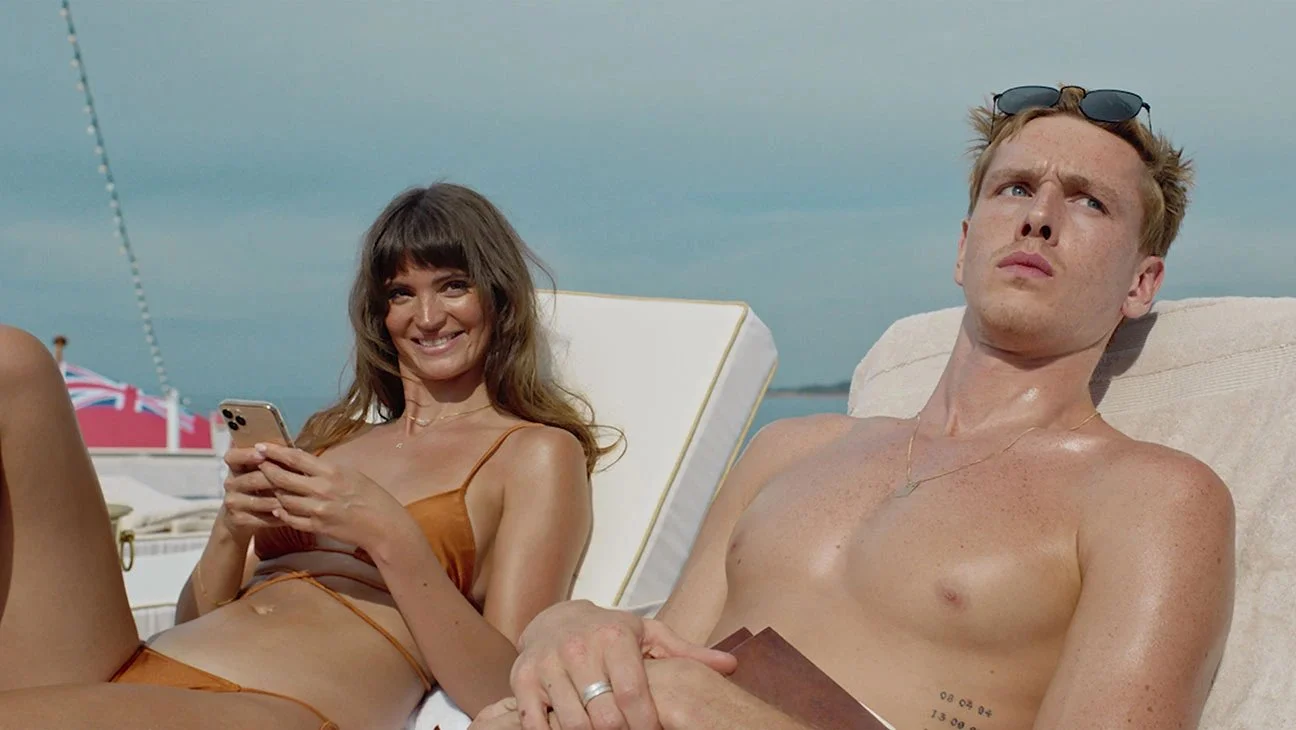Triangle of Sadness
Directed by Ruben Östlund
Running time: 2hrs30 | REVIEWED BY CATHERINE BRAY
Charlbi Dean and Harris Dickinson in Triangle of Sadness
Imagine a world where cinema never showed any violence. Where cinema never showed anybody shitting or vomiting. A world where cinema never showed anybody being mean or unpleasant or unjust to one another. What kind of portrait would that be? It would be a fucking flattering one, that’s what! A self-aggrandising, airbrushed vision of a species that I personally would have a tough time recognising. It might be a nice, wholesome watch. But representation is important, guys; so thank god for Ruben Östlund.
Östlund’s new comedy, Triangle of Sadness, will probably be described as “an attack on” the super-rich, the fashion industry, influencers. But hey, if an accurate portrayal of someone seems like an attack, that’s on the subject, isn’t it? What was it Oscar Wilde said? The 19th century dislike of Realism is the rage of Caliban seeing his own face in the mirror. Something like that.
I’ll admit this film isn’t exactly working in a fully Realist mode, if by this we mean a story set on a typical day and aiming for the illusion of verisimilitude. This story is (mostly) set on a luxury cruise, beset by a series of fuck-ups, which is not typical for a luxury cruise. If this portrayal strains credulity at any point, it’s the point at which these rich arseholes stop getting exactly what they want every minute of every day.
My theory is, we’re so used to broadly flattering portrayals of rich folks that even a straightforwardly accurate portrait of them feels like a dig. Sometimes it’s ok to go after the low-hanging fruit, precisely for having sunk so low in the first place. It’s a tonic to see a film powered by anger that doesn’t forget to be funny, and to see satire whose humour doesn’t leaven it. The lols here don’t de-fang the politics, they enhance them. Humour can be used to humanise monsters (several regrettable political careers have depended on this), but it can also be used to dehumanise people who behave inhumanly, and that’s what Östlund does here so brilliantly.
OK, time out.
You can skip this paragraph if you want. There’s a voice in my head right now saying, “Catherine, you can’t just be comparing a Ruben Östlund film to Ghost Ship.” But it’s losing out to the other voice which is saying, “ok, but Ghost Ship, though.” As anyone who has seen Ghost Ship will know, it contains two superb scenes in an otherwise average movie. But man, those scenes really go hard. In the first, which opens the film, a shipful of wealthy luxury liner passengers get bisected, and in the second, a mid-film montage set to Nine Inch Nails, we see why and how the rest of it all went down. Both sequences are glorious; everything I want from cinema. Triangle of Sadness has the exact same energy — the craftsmanship, the rage, the humour. Both Ghost Ship sequences are horror, filmed with a comedic rhythm. My favourite scenes in Triangle of Sadness do the same thing — there’s a slapstick grace to scenes of vomiting, shitting and seasickness that belies the John Waters of it all. I do wonder if Östlund has seen Ghost Ship. I did hear a rumour that he apparently had Rage Against the Machine on the temp track for this at one point during the edit, which again… same energy.
Comedy sometimes has a rough time at the arthouse: if you’re too funny, there’s a suspicion that maybe you aren’t taking things seriously enough. Still, some of the best films to play at Cannes over the years have been very funny indeed, with their humour sometimes accompanied by a hefty serving of bleakness or shock value. Toni Erdmann. Elle. Parasite. In fact, of all the Cannes predecessors Triangle of Sadness most recalls, it’s probably Bong Joon-ho’s Palme d’Or winner. I didn’t think I was going to be coming out of the festival this year recommending a new favourite on the basis that it’s Parasite meets Ghost Ship (and that’s a good thing), but here we are. Triangle of Sadness is a total delight.
TRIANGLE OF SADNESS (2022) Written by Ruben Östlund | Shot by Fredrik Wenzel | Edited by Mikel Cee Karlsson, Ruben Östlund
Selected for the Competition at the 75th Cannes Film Festival
